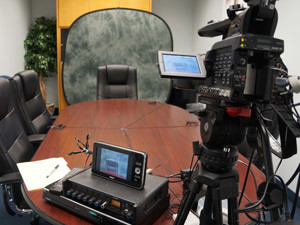The Function of Legal Videography in Depositions and Trials
Lawful videography has actually become a vital tool in both depositions and tests, giving a complex strategy to recording witness testimonies. By capturing not just the spoken word but additionally the nuances of non-verbal communication, this tool improves the integrity of statements and preserves critical proof for future procedures (legal videography). As attorneys progressively recognize its worth, it triggers a deeper exam of exactly how these visual documents can influence juror perceptions and test results. What implications might these growths hold for the future of lawful method?

Importance of Lawful Videography
Lawful videography plays an essential role in the documents and presentation of depositions and tests. This specialized area integrates technological skills with legal expertise to produce a reliable document of procedures that can considerably affect case results. The aesthetic facet of legal videography improves the understanding of witness testament, permitting jurors and judges to observe not only the talked words yet also the attitude, feelings, and body movement of the witnesses.
Additionally, legal videography provides an objective account of occasions, decreasing the potential for misconception that can happen with composed transcripts alone. This visual documentation works as a critical device throughout trial presentations, facilitating a more clear and even more convincing narrative for both plaintiffs and offenders. The capacity to replay video clip sections during court proceedings enables lawful teams to stress crucial factors, reinforcing their arguments properly.
The value of legal videography expands past the court; it also plays an essential function in preserving proof for future recommendation, whether for appeals or additional legal activity. Its assimilation right into the legal procedure is important for making certain a fair and exact representation of the truths, ultimately adding to the pursuit of justice.

Process of Legal Videography
While recording the subtleties of depositions and tests, the process of lawful videography entails several vital actions that ensure premium, exact recordings. Initially, an expert lawful videographer prepares by evaluating the situation products and understanding the specific demands of the deposition or test. This prep work consists of familiarizing themselves with the participants and the context, which assists in capturing significant details.
On the day of the recording, the videographer establishes the required devices, which typically includes high-def cameras, microphones, and correct lights. Ensuring optimal angles and sound quality is crucial, as it directly influences the performance of the recording. The videographer connects with lawyers and individuals to develop procedures, making sure that everybody understands the recording process.
Throughout the deposition or test, the videographer carefully tape-records the proceedings, paying attention to both spoken and non-verbal cues. This includes recording the temperament and responses of witnesses and attorneys. After the session concludes, the videographer might edit the footage for quality and compliance with legal criteria, creating an end product that precisely reflects the proceedings for future referral and usage in legal contexts.
Advantages in Depositions
The consolidation of videography in depositions offers countless benefits that enhance the total process of collecting proof. One primary advantage is the capability to record witness testaments with visual and acoustic fidelity, giving a much more accurate depiction of the witness's attitude, tone, and body language. This multidimensional strategy enables lawyers and juries to analyze integrity better than conventional written records alone.
Additionally, videographed depositions function as a powerful tool for maintaining testimony. Must a witness become not available for test, their taped deposition can be played in court, guaranteeing that their proof continues to be easily accessible and pertinent. This aspect dramatically decreases the threat of losing important details that could affect instance outcomes.

Last but not least, videography boosts the overall professionalism of the deposition process, instilling confidence in clients relating to the thoroughness of their legal representation (legal videography). By leveraging innovation, lawful professionals can significantly improve the effectiveness of depositions
Influence On Trials
In lots of trials, the integration of videography can significantly influence the discussion of proof and the court's assumption. Legal videography catches witness statements and important proof in a vibrant format, allowing jurors to engage with the material on multiple levels. This aesthetic component improves the storytelling facet of a test, offering context and emotional vibration that conventional text-based evidence might lack.
Furthermore, video recordings can work as powerful devices for impeachment during cross-examination. When disparities develop between a witness's previous declarations and their courtroom testament, video proof offers an objective reference that can guide jurors' viewpoints. This immediacy and clarity can boost the integrity of a celebration's story while concurrently undermining opposing disagreements.

Future Trends in Legal Videography
As we look towards the future of lawful videography, a number of arising patterns promise to reshape its role within the courtroom. One significant pattern is the combination of man-made knowledge (AI) in video analysis and editing. AI can streamline the procedure of recognizing vital minutes in taped depositions, enabling attorneys to quickly access pertinent web content, therefore improving effectiveness in case prep work.
In addition, the increase of virtual fact (VIRTUAL REALITY) and enhanced reality (AR) modern technologies is anticipated to change just how jurors experience evidence. legal videography. By immersing jurors in a substitute atmosphere, these technologies can give a much more extensive understanding of complicated scenarios, leading to even more informed considerations
Additionally, the enhancing need for remote depositions, sped up by the COVID-19 pandemic, will likely continue. Lawful videographers will require to click for more adapt to brand-new software application and platforms to make sure premium recordings in virtual setups.
Lastly, the expanding emphasis on information security will certainly necessitate more stringent protocols for keeping and sharing video evidence. As the lawful landscape develops, lawful videographers should remain abreast of these trends to keep their relevance and efficiency in the judicial procedure.
Final Thought
In recap, lawful videography serves a crucial feature in the judicial process, improving the integrity of depositions and tests. As modern technology proceeds to evolve, legal videography look here is poised to additional change its duty within the lawful landscape.